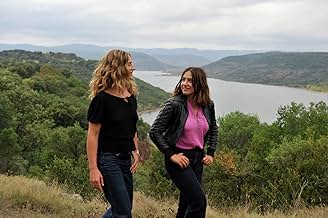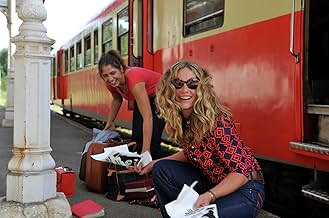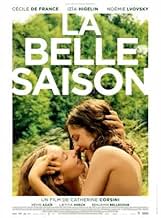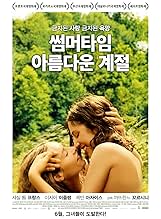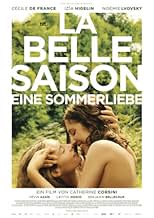La belle saison
- 2015
- Tous publics
- 1h 45m
IMDb RATING
6.7/10
6K
YOUR RATING
A young woman moves from the French countryside to Paris and begins a passionate love affair with a feminist leader in this drama set in 1970s France.A young woman moves from the French countryside to Paris and begins a passionate love affair with a feminist leader in this drama set in 1970s France.A young woman moves from the French countryside to Paris and begins a passionate love affair with a feminist leader in this drama set in 1970s France.
- Director
- Writers
- Stars
- Awards
- 3 wins & 8 nominations total
Cécile de France
- Carole
- (as Cécile De France)
Natalie Beder
- Marie-Laure
- (as Nathalie Beder)
Nathalie Lovigui
- Une militante MLF dans l'amphi
- (as Nathalie Lovighi)
- Director
- Writers
- All cast & crew
- Production, box office & more at IMDbPro
Featured reviews
Watched on Apple TV. I rented it for 2 dollars. Not a bad deal. I don't have much faith in French movies because most of them have too much nudity, or are highly sexual or are very boring. I watch them and I am like "what did I just watch". I thought it would be a typical French erotic soft porn movie but I was wrong. Not too many explicit scenes, and the plot was okay. Same sex relationship/marriage was strongly opposed in the 70s in French and it was prohibited in every country too I think. This movie shows how two women from two different classes try to break the rules to tell the world that homosexuality should be legal. Two different women with different personalities but share some similar beliefs.
'La Belle Saison' is set in 1971 when women were asserting their rights – as indeed a lot of folk were doing the same to a world that was not really ready. This is set against the lives of Delphine from a rural farming family. She escapes to Paris where she happens to cross paths with the fiery Carole (Cécile de France – 'Meserine').
Then amidst the heady cocktail of feminism, liberation and radical politics they expressed themselves sexually – which of course was revolutionary. Yes they set about challenging the heterosexual orthodoxy - and found more than just a political statement in that they fell for each other.
Now there is tons more to this inspiringly brilliant film. It is made in such a way that the characters come alive and are completely believable. All the performances are outstanding and the period detail is really good too. The hair and fashions as well as the vehicles are spot on – and some nice Janis Joplin songs on the soundtrack too. There is so much here to like that it is a very easy job to recommend.
Then amidst the heady cocktail of feminism, liberation and radical politics they expressed themselves sexually – which of course was revolutionary. Yes they set about challenging the heterosexual orthodoxy - and found more than just a political statement in that they fell for each other.
Now there is tons more to this inspiringly brilliant film. It is made in such a way that the characters come alive and are completely believable. All the performances are outstanding and the period detail is really good too. The hair and fashions as well as the vehicles are spot on – and some nice Janis Joplin songs on the soundtrack too. There is so much here to like that it is a very easy job to recommend.
An enjoyable film, with some great performances; but less travelled country roads should be rather more bumpy.
While a far from novel story, the three female leads (Izïa Higelin, Cécile de France and Noémie Lvovsky) give pitch perfect performances.
Where this film falls down is in giving the two lovers, far too smooth a ride. If you're fighting for freedom, surely the establishment would offer far more resistance? Here, the revolutionaries hardly seem to experience any push-back. There's one bump in the road, but that's really it.
While a far from novel story, the three female leads (Izïa Higelin, Cécile de France and Noémie Lvovsky) give pitch perfect performances.
Where this film falls down is in giving the two lovers, far too smooth a ride. If you're fighting for freedom, surely the establishment would offer far more resistance? Here, the revolutionaries hardly seem to experience any push-back. There's one bump in the road, but that's really it.
I didn't much care for the first half of 'Summertime': a posse of beautiful, self-confident and middle-class young feminists assert their right to "to as they please" in the Paris of the 1970s. What is absent from the portrayal is any sense of the personal insecurity that cripples most of us; these sisters, it seems, can quite literally do anything for themselves. The film becomes more nuanced when it follows two of its protagonists (a lesbian couple) back to the farm in the country where one of them (Delphine) grew up, and whence she has now been summoned owing to the illness of her father. There's still some idealisation here: the family own their farm and live a simple peasant life. But the conflict between Delphine's familial and spatial sense of identity, and the new relationship she has forged in the city, is nicely portrayed, as is the guarded hostility of her mother and her local acquaintances to the choices she has made in her new life. Overall, it's not nearly as strong as 'Blue is the Warmest Colour', but it grew on me as I watched it.
LGBT rights are more relevant than ever. In several countries, unfortunately, the trend is towards more difficult living conditions for gays and transgender people. Seen in such a perspective, the plot of this film remains relevant, despite the fact that it depicts a summer in 1971.
Although perhaps the problem here is something we have seen in many films, the film is experienced as both engaging and well told.
I sat thinking when I saw this movie; how many such fates exist? Both before and now? That people cannot live their lives to the fullest, in fear of condemnation from their surroundings. There are probably a lot of them, and in that way such films become important and unfortunately relevant. For such films we need. We need to be reminded of how the world treats and views queer people. In addition to a strong and pointed action, the film is also beautifully filmed, well directed and with good actors who get both convincing and engaging.
Did you know
- TriviaDirector Catherine Corsini stated that she named the two main characters Carole and Delphine after real life artists and feminists Carole Roussopoulos and Delphine Seyrig.
- GoofsAfter a swim in the pond, the girls lay out to take some sun. As Carole lays naked on the blanket resting her head on Delphine, her arms are raised and we can see she does not have any underarm hair. As the girls start to kiss and caress Carole's armpit is exposed again but this time full of underarm hair.
- ConnectionsReferenced in Théo et Hugo dans le même bateau (2016)
- SoundtracksL'Hymne du MLF, d'apres Le Chant des Marais
(Johann Esser/Wolfgang Langhoff/Rudi Goguel)
With the kind permission of Edition Peters Group
All rights reserved
- How long is Summertime?Powered by Alexa
Details
- Release date
- Countries of origin
- Official site
- Languages
- Also known as
- Summertime
- Filming locations
- Haute-Vienne, France(scenes in the country)
- Production companies
- See more company credits at IMDbPro
Box office
- Budget
- €4,800,000 (estimated)
- Gross US & Canada
- $35,322
- Opening weekend US & Canada
- $15,413
- Jul 24, 2016
- Gross worldwide
- $3,778,938
Contribute to this page
Suggest an edit or add missing content


![Watch Bande-annonce [OV]](https://m.media-amazon.com/images/M/MV5BMzZiZTVkNWItZGNjYS00ZDY2LWFkOGItZjhkNTk2NDQ3ZDE2XkEyXkFqcGdeQXRyYW5zY29kZS13b3JrZmxvdw@@._V1_QL75_UX500_CR0)


